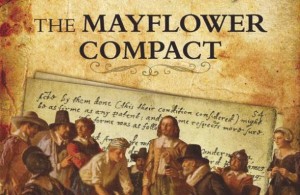Special to WorldTribune.com
Capt. Peter O’Brien (USN-Ret.), London Center for Policy Research
Last week (Nov. 21st) marked the 394th anniversary of the signing of one of the important documents in history: the Mayflower Compact.
 The document is not quite what some think it; it is not a declaration of independence from England and the King. But it is critical in understanding what happened between 1620 and 1776.
The document is not quite what some think it; it is not a declaration of independence from England and the King. But it is critical in understanding what happened between 1620 and 1776.
The Pilgrims left England due to religious persecution, moving to Holland in 1606, where there was more tolerance. For several reasons, in particular a difficulty in mixing with Dutch culture, they decided to look for another place to live, and they settled on Virginia. Fortunately for us, the sea, the ship and the weather didn’t cooperate and they landed in what is now Plymouth, Massachusetts.
Before they disembarked, they drafted a document — the Compact. The point of the Compact was simple: they had departed Amsterdam without a charter for land or trade, etc., once they reached the Americas, there was concern among the Pilgrims that some of them might decide they were free and unbound by any sense of commitment to the investors who had funded the voyage. As that was considered to be a dangerous precedent, they drew up the Compact.
The key line in the Compact is this:
“…do by these presents, solemnly and mutually, in the presence of God, and one another, covenant and combine ourselves together into a civil body politic; for our better ordering, and preservation and furtherance of the ends aforesaid; and by virtue hereof to enact, constitute, and frame, such just and equal laws, ordinances, acts, constitutions, and offices, from time to time, as shall be thought most meet and convenient for the general good of the colony…”
They had written the first governing document in all of history written by the citizenry, for the citizenry; establishing both the ascendancy of the people over the government (the people establish the rules of the government, not the government) and thereby also limiting government to act within those ‘just and equal laws.’
This set the stage for a long line of leading figures from New England in the 1600s and 1700s who championed concepts of popular, limited government.
But, the Massachusetts Charter (1691) superceded the Compact, limiting many rights and powers that had been held by the people, and ending elections for many leading colonial offices. That step might be said to be the first real ‘sand in the gears’ of colonial politics. That wasn’t enough for England; in 1774 Parliament abrogated the Charter and issued the Massachusetts Government Act, stripping colonials of what little power remained, vesting all power in royal appointees. This led to the Suffolk Resolves (September 1774), which rejected the Massachusetts Government Act and called for a boycott of a wide range of British goods. The Boston Tea Party followed (16 December 1774) and then came the tumultuous year of 1775. The rest, as they say, is history. And at its root, the Compact. The Founding Fathers recognized the Compact as one of the intellectual wellsprings from which came the U.S. Constitution.
So, perhaps it’s fitting as we celebrate Thanksgiving, that we remember this remarkable document by some ‘ordinary’ people, that we remember what the Pilgrims set in motion, and some of the things that we have to be truly thankful for: a limited government, which has only those powers specifically granted to it by the people; a nation in which the people are the masters, and the politicians and bureaucrats are servants; a government of laws, not men, where all are equally subject to the law, no matter what office they hold or what title they claim; and a participatory government, one in which decisions are best made slowly and with deliberation, mindful that men acting in haste often make bad decisions.
And we should also remember the seductive nature of power, and the hubris that grows in some of those in power that leads them to believe that they can act outside of the law, outside of the Constitution itself.
A Happy Thanksgiving to all.

You must be logged in to post a comment Login